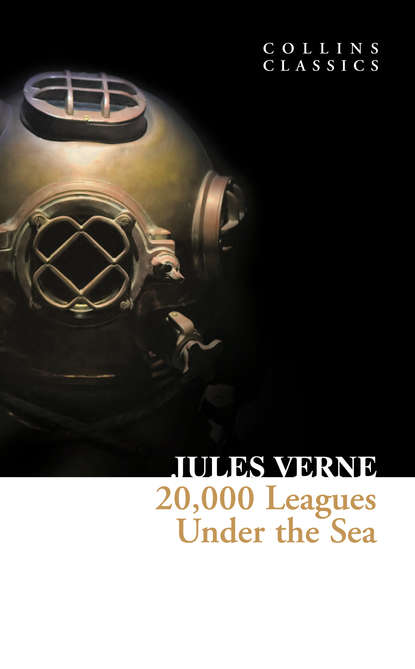По всем вопросам обращайтесь на: info@litportal.ru
(©) 2003-2024.
✖
20,000 Leagues Under The Sea
Настройки чтения
Размер шрифта
Высота строк
Поля
‘Let monsieur have patience,’ said the impassible Conseil.
The sudden lighting of the cabin had allowed me to examine its least details. It only contained the table and five stools. The invisible door seemed hermetically closed. No noise reached our ears. All seemed dead in the interior of this machine. Was it moving, or was it motionless on the surface of the ocean, or deep in its depths? I could not guess.
However, the luminous globe was not lighted without a reason. I hoped that the men of the crew would soon show themselves, and my hope was well founded. A noise of bolts and bars being withdrawn was heard, the door opened, and two men appeared. One was short in stature, vigorously muscular, with broad shoulders, robust limbs, large head, abundant black hair, thick moustache, and all his person imprinted with that southern vivacity which characterises the Provençal inhabitants of France.
The second deserves a more detailed description. I read at once his dominant qualities on his open face – self-confidence, because his head was firmly set on his shoulders, and his black eyes looked round with cold assurance – calmness, for his pale complexion announced the tranquillity of his blood – energy, demonstrated by the rapid contraction of his eyebrows; and, lastly, courage, for his deep breathing denoted vast vital expansion. I felt involuntarily reassured in his presence, and augured good from it. He might be of any age from thirty-five to fifty. His tall stature, wide forehead, straight nose, clear-cut mouth, magnificent teeth, taper hands, indicated a highly-nervous temperament. This man formed certainly the most admirable type I had ever met with. One strange detail was that his eyes, rather far from each other, could take in nearly a quarter of the horizon at once. This faculty – I verified it later on – was added to a power of vision superior even to that of Ned Land. When the unknown fixed an object he frowned, and his large eyelids closed round so as to contract the range of his vision, and the result was a look that penetrated your very soul. With it he pierced the liquid waves that looked so opaque to us as if he read to the very depths of the sea.
The two strangers had on caps made from the fur of the sea-otter, sealskin boots, and clothes of a peculiar texture, which allowed them great liberty of movement.
The taller of the two – evidently the chief on board – examined us with extreme attention without speaking a word. Then he turned towards his companion, and spoke to him in a language I could not understand. It was a sonorous, harmonious, and flexible idiom, of which the vowels seemed very variously accented.
The other answered by shaking his head and pronouncing two or three perfectly incomprehensible words. Then, from his looks, he seemed to be questioning me directly.
I answered in good French that I did not understand his language; but he did not seem to know French, and the situation became very embarrassing.
‘If monsieur would relate his story,’ said Conseil, ‘these gentlemen may understand some words of it.’
I began the recital of my adventures, articulating clearly all my syllables, without leaving out a single detail. I gave our names and qualities. The man with the soft, calm eyes listened to me calmly, and even politely, with remarkable attention. But nothing in his face indicated that he understood me. When I had done he did not speak a single word.
There still remained one resource, that of speaking English. Perhaps they would understand that almost universal language. I knew it, and German too, sufficiently to read it correctly, but not to speak it fluently.
‘It is your turn now, Land,’ I said to the harpooner. ‘Make use of your best English, and try to be more fortunate than I.’
Ned did not need urging, and began the same tale in English, and ended by saying what was perfectly true, that we were half dead with hunger. To his great disgust, the harpooner did not seem more intelligible than I. Our visitors did not move a feature. It was evident that they neither knew the language of Arago nor Faraday. I was wondering what to do next, when Conseil said to me, –
‘If monsieur will allow me, I will tell them in German.’
‘What! do you know German?’ I cried.
‘Like a Dutchman, sir.’
‘Well, do your best, old fellow.’
And Conseil, in his tranquil voice, told our story for the third time, but without success.
I then assembled all the Latin I had learnt at school, and told my adventures in that dead language. Cicero would have stopped his ears and sent me to the kitchen, but I did the best I could with the same negative result.
After this last attempt the strangers exchanged a few words in their incomprehensible language, and went away without a gesture that could reassure us. The door closed upon them.
‘It is infamous!’ cried Ned Land, who broke out again for the twentieth time. ‘What! French, English, German, and Latin are spoken to those rascals, and not one of them has the politeness to answer.’
‘Calm yourself,’ said I to the enraged harpooner; ‘anger will do no good.’
‘But do you know, professor,’ continued our irascible companion, ‘that it is quite possible to die of hunger in this iron cage?’
‘Bah!’ exclaimed Conseil; ‘with exercising a little philosophy we can still hold out a long while.’
‘My friends,’ said I, ‘we must not despair. We have been in worse situations before now. Do me the pleasure of waiting before you form an opinion of the commander and crew of this vessel.’
‘My opinion is already formed,’ answered Ned Land. ‘They are rascals—’
‘Well, and of what country?’
‘Of Rascaldom!’
‘My worthy Ned, that country is not yet sufficiently indicated on the map of the world, and I acknowledge that the nationality of those two men is difficult to determine. Neither English, French, nor German, that is all we can affirm. However, I should be tempted to admit that the commander and his second were born under low latitudes. There is something meridional in them. But are they Spaniards, Turks, Arabians, or Indians? Their physical type does not allow me to decide; as to their language, it is absolutely incomprehensible.’
‘That is the disadvantage of not knowing every language,’ answered Conseil, ‘or the disadvantage of not having a single language.’
‘That would be of no use,’ answered Ned Land. ‘Do you not see that those fellows have a language of their own – a language invented to make honest men who want their dinners despair? But in every country in the world, to open your mouth, move your jaws, snap your teeth and lips, is understood. Does it not mean in Quebec as well as the Society Islands, in Paris as well as the Antipodes, “I am hungry – give me something to eat!”’
‘Oh,’ said Conseil, ‘there are people so unintelligent—’
As he was saying these words the door opened, and a steward entered. He brought us clothes similar to those worn by the two strangers, which we hastened to don.
Meanwhile, the servant – dumb and deaf too in all appearance – had laid the cloth for three.
‘This is something like,’ said Conseil, ‘and promises well.’
‘I’ll bet anything there’s nothing here fit to eat,’ said the harpooner. ‘Tortoise liver, fillets of shark, or beefsteak from a sea-dog, perhaps!’
‘We shall soon see,’ said Conseil.
The dishes with their silver covers were symmetrically placed on the table. We had certainly civilised people to deal with, and had it not been for the electric light which inundated us, I might have imagined myself in the Adelphi Hotel in Liverpool, or the Grand Hotel in Paris. There was neither bread nor wine, nothing but pure fresh water, which was not at all to Ned Land’s taste. Amongst the dishes that were placed before us I recognised several kinds of fish delicately cooked; but there were some that I knew nothing about, though they were delicious. I could not tell to what kingdom their contents belonged. The dinner service was elegant and in perfect taste; each piece was engraved with a letter and motto of which the following is a fac-simile:–
Mobilis in Mobile.
N.
Mobile in a mobile element! The letter N was doubtless the initial of the enigmatical person who commanded at the bottom of the sea.
Ned and Conseil did not observe so much. They devoured all before them, and I ended by imitating them.
But at last even our appetite was satisfied, and we felt overcome with sleep. A natural reaction after the fatigue of the interminable night during which we had struggled with death.
My two companions lay down on the carpet, and were soon fast asleep. I did not go so soon, for too many thoughts filled my brain; too many insoluble questions asked me for a solution; too many images kept my eyes open. Where were we? What strange power was bearing us along? I felt, or rather I thought I felt, the strange machine sinking down to the lowest depths of the sea. Dreadful nightmares took possession of me. I saw a world of unknown animals in these mysterious asylums, amongst which the submarine boat seemed as living, moving, and formidable as they. Then my brain grew calmer, my imagination melted into dreaminess, and I fell into a deep sleep.
CHAPTER 9 Ned Land’s Anger (#ulink_73493eb6-b102-5f73-9fdd-a565eae28cdf)
I do not know how long our sleep lasted, but it must have been a long time, for it rested us completely from our fatigues. I awoke first. My companions had not yet moved.
I had scarcely risen from my rather hard couch when I felt all my faculties clear, and looked about me.
Nothing was changed in the room. The prison was still a prison, and the prisoners prisoners. The steward, profiting by our sleep, had cleared the supper things away. Nothing indicated an approaching change in our position, and I asked myself seriously if we were destined to live indefinitely in that cage.
This prospect seemed to me the more painful, because, though my head was clear, my chest was oppressed. The heavy air weighed upon my lungs. We had evidently consumed the larger part of the oxygen the cell contained, although it was large. One man consumes in one hour the oxygen contained in 176 pints of air, and this air, then loaded with an almost equal quantity of carbonic acid, becomes unbearable.
It was, therefore, urgent to renew the atmosphere of our prison, and most likely that of the submarine boat also. Thereupon a question came into my head, ‘How did the commander of this floating dwelling manage? Did he obtain air by chemical means, by evolving the heat of oxygen contained in chlorate of potassium, and by absorbing the carbonic acid with caustic potassium? In that case he must have kept up some relations with land in order to procure the materials necessary to this operation. Did he confine himself simply to storing up air under great pressure in reservoirs, and then let it out according to the needs of his crew? Perhaps. Or did he use the more convenient, economical, and consequently more probable means of contenting himself with returning to breathe on the surface of the water like a cetacean, and of renewing for twenty-four hours his provision of atmosphere? Whatever his method might be, it seemed to me prudent to employ it without delay.

















